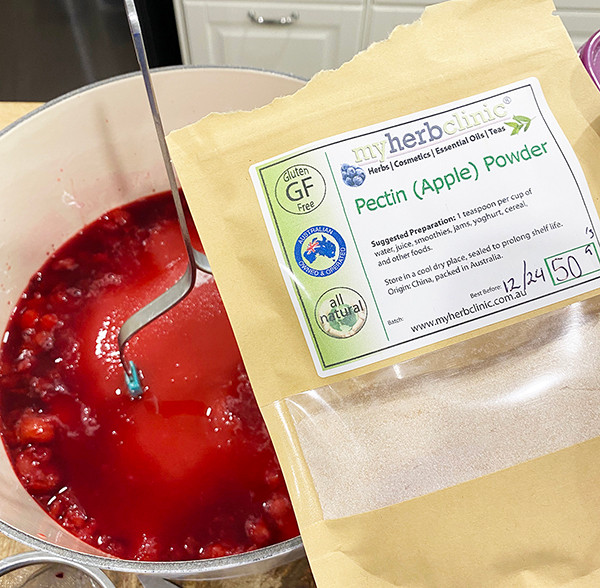The Uses and Benefits of Pectin
The main use of Pectin is in food manufacturing both for home cooks and in commercial applications. It is used as a thickening agent like gelatin, and is well known for its use in jams, jellies and preserve making. It is also used to stabilize yoghurt and flavoured milk drinks.
You may not be aware that Pectin is also a popular health supplement used with the aim of bulking stool to reduce and treat constipation, balance blood sugar, lower cholesterol levels, promote healthy weight, and balance the gut microbiome. In pharmaceutical manufacturing it is used to coat slow-release tablets and capsules to slow down their absorption in the body.
So What is Pectin?
Pectin is
actually a natural insoluble fibre found in a variety of fruits. Insoluble
fibre is a carbohydrate that the human body cannot break down and digest,
instead it absorbs liquid and gels up. While the human digestive system
may not be able to metabolise pectin, we do have a rich microbiome full of gut
bacteria that just loves insoluble fibre, and consuming pectin may help promote
a healthy balance of beneficial gut bacteria.
The most popular sources of pectin are from citrus and apple peels. So pectin
is naturally gluten free and suitable for vegetarians and vegans.
How does Pectin promote healthy outcomes?
Well as mentioned
above, it feeds our beneficial gut bacteria, which helps promote a healthy and
balanced gut microbiome. A healthy microbiome is important as it helps us
breakdown and digest our food and produces and helps us absorb important vitamins
like B12. It also helps regulate our immune system and protect against harmful
pathogens that may cause disease. A person with a healthy microbiome is more
likely to be healthy overall.
The effects noted in studies also have to do with how the pectin acts within
the digestive tract. It absorbs fluid and gels up, increasing in size. This in
turn helps bulk and lubricate stool, which means less constipation and a
healthier bowel. Part of this bulking, binding and absorbing action also binds
cholesterol in the gut, preventing it from being absorbed, and slows down the
absorption of sugars. This leads to more regulated sugar uptake and blood sugar
levels, as well as reduced cholesterol and triglyceride levels.
When your gut is functioning well, with a healthy microbiome and healthy bowel
movements, you can better protect against disease, more readily absorb key nutrients,
and eliminate waste that your body does not need, rather than absorbing them.
When you suffer from constipation you are often absorbing new toxins as well as
reabsorbing waste that your body is trying to get rid of.
All of these factors may help promote a healthy weight, but pectin may also help with this aim as it can help you feel more ‘full’ which could lead to less overeating. When it bulks up in your digestive tract it should promote a feeling of ‘fullness’ or ‘satiety’ which triggers a release of hormones to tell your brain you are full and leads to a reduction in caloric intake – in simple terms, you eat less!
How do I use Pectin?
You can use Apple
Pectin, Citrus Pectin, or a mix of the two in recipes to create delicious jams,
jellies and preserves. Using Pectin means that less sugar is needed to create
the set product! Of course, these are still special treat foods that contain
sugar, so don’t overconsume them!
You can also add it to water or smoothies to increase your fibre intake. This
is a really simple way to get more fibre in your diet.
Safety and Risks of Pectin
Pectin is
incredibly safe to consume and should not cause any issues for most people. It
is a naturally occurring fibre found in most fruits and vegetables. If you have
an allergy to the food source of the pectin you should not consume the product.
If you have problems digesting natural fibre then consuming large amounts of
pectin may cause bloating and discomfort.
Because of the bulking and binding nature of pectin, you should not consume it
within 30 minutes of taking any prescription medications, as it may slow or
reduce the absorption.
Recent Posts
-
Neuro Wellness in 2026: Supporting Mind & Mood Naturally with Herbs & Mushroom Powders
In 2026, one of the fastest-growing wellness trends is neuro wellness, a holistic approach to suppor …8th Jan 2026 -
Christmas Recipe Ideas with My Herb Clinic: Festive Drinks, Baking Classics & Savoury Creations
Christmas in Australia arrives with warm breezes, longer evenings, and that familiar mix of nostalgi …2nd Dec 2025 -
The Life of a Dough-Girl: Natural Powders for Show-Stopping Tea, Baking & Sourdough Decoration
Opening night for your pantry. From quick-change colours to encore-worthy flavour, these herb and fr …16th Oct 2025




